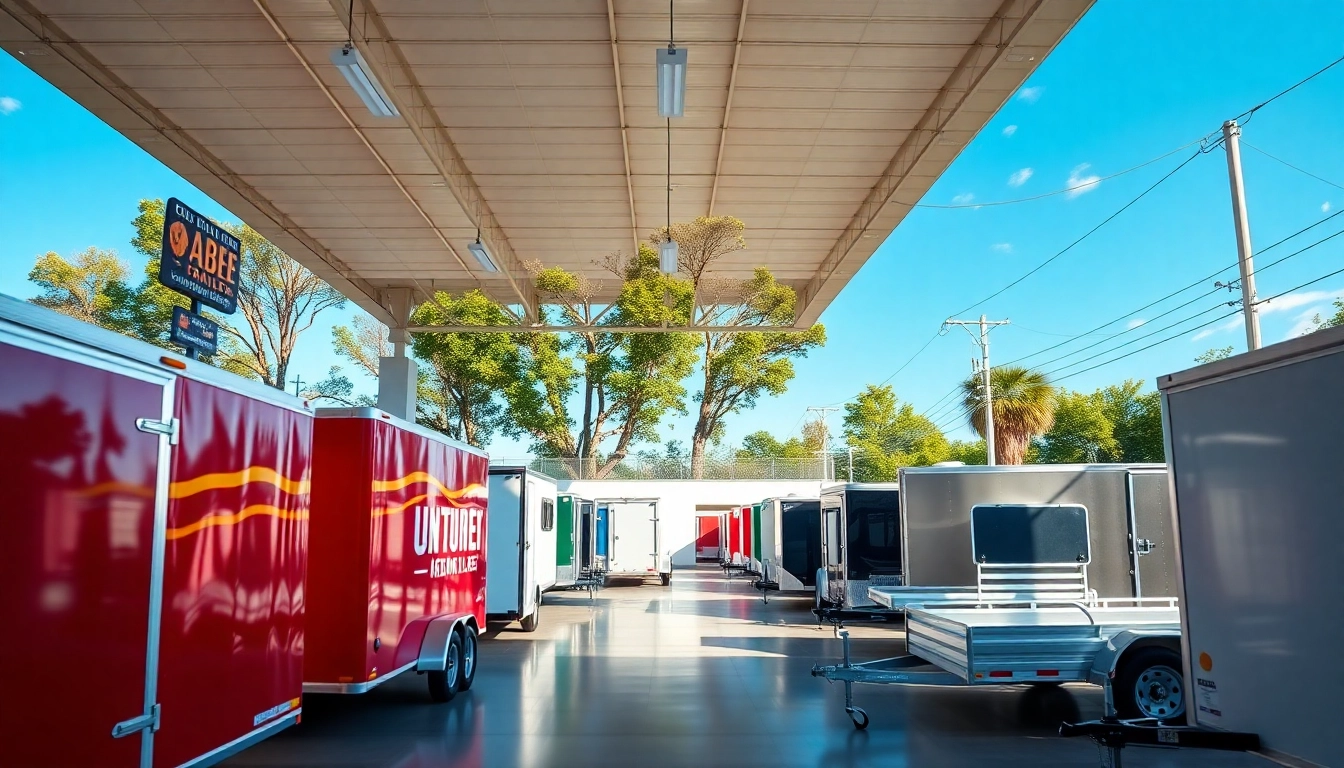1. Understanding Trailers: Types and Uses
Trailers play a crucial role in various industries, serving as versatile tools for transportation, storage, and even living accommodations. In this extensive guide, we will delve into the different types of trailers for sale in Massachusetts available to consumers, common uses across several sectors, and the essential features that make trailers effective and reliable.
1.1 Different Types of Trailers for Sale in Massachusetts
When shopping for trailers, understanding the variety available is essential. Here are some primary types of trailers commonly found for sale in Massachusetts:
- Utility Trailers: Lightweight and versatile, utility trailers are ideal for hauling smaller loads such as landscaping materials, ATVs, or motorcycles.
- Cargo Trailers: Enclosed trailers that provide protection from the elements for goods and equipment, cargo trailers are perfect for moving sensitive items.
- Dump Trailers: Equipped with hydraulic lifts, dump trailers are designed for carrying and unloading materials like gravel, dirt, and construction debris.
- Car Hauler Trailers: Specifically designed for transporting vehicles, car hauler trailers come with ramps and various configurations to accommodate cars of different sizes.
- Boat Trailers: Essential for boat owners, these trailers are designed to transport boats to and from water, often featuring specialized cradles and support.
1.2 Common Uses for Trailers Across Industries
Different industries utilize trailers for numerous applications. Here are some examples:
- Construction: Mobile equipment and debris transport make dump trailers valuable assets to construction sites.
- Landscaping: Utility trailers enable landscapers to carry tools, plants, and materials efficiently.
- Transportation: Businesses often use cargo trailers for local deliveries, ensuring products are protected.
- Recreation: Many families invest in travel trailers or toy haulers for camping and recreational activities.
1.3 Key Features to Look for in a Trailer
When selecting a trailer, certain characteristics can significantly influence its performance and suitability for your needs. Key features to consider include:
- Weight Capacity: Understanding the maximum load a trailer can handle is crucial for safety and effectiveness.
- Durability: Materials used in construction, such as steel or aluminum, can impact the trailer’s longevity and corrosion resistance.
- Tongue Weight: The trailer’s design should ensure proper weight distribution for stability during transportation.
- Braking System: Adequate braking features are vital for safe towing, especially with larger trailers.
2. Why Buy Locally: Advantages of Massachusetts Dealers
Purchasing a trailer from a local dealer in Massachusetts can provide several benefits that can enhance your buying experience and foster community engagement.
2.1 Supporting Local Businesses: A Community Approach
Buying from local trailer dealers supports your community’s economy. Investing in Massachusetts-based businesses helps create jobs and promotes local entrepreneurship. This community-oriented approach fosters a healthier economic environment for everyone involved.
2.2 Personalized Service and Expertise
Local dealerships often provide personalized service that national chains may lack. Knowledgeable staff can offer insights into the types of trailers best suited for your specific requirements and the local terrain characteristics you may encounter while towing.
2.3 Availability of Custom Options at Local Dealerships
Many local dealers offer customizable trailers to meet specific customer needs. Whether you require additional storage compartments, specialized shelving, or custom paint jobs, local dealers can often facilitate these requests without excessive delays or costs.
3. Factors to Consider When Buying a Trailer
Before making a purchase, it’s vital to assess various factors to ensure you select the right trailer for your requirements.
3.1 Assessing Your Hauling Needs
Start by evaluating your hauling needs. Consider what you plan to transport, including weight, dimensions, and the frequency of use. These factors will greatly influence the type and size of trailer you need.
3.2 Budgeting for a Trailer Purchase
Understanding your budget is critical. Do not forget to account for additional costs such as registration, insurance, maintenance, and any customization you might need post-purchase. This can prevent unpleasant surprises later on.
3.3 Maintenance and Long-term Care Considerations
Buying a trailer isn’t just about the initial purchase. Maintenance is essential for ensuring the longevity of your investment. Make sure to familiarize yourself with the care requirements of the specific type of trailer you choose.
4. Financing Options for Trailers for Sale in Massachusetts
Many buyers opt to finance their trailer purchases. Understanding the available options can help you make informed decisions regarding your finances.
4.1 Understanding Trailer Financing Basics
Financing a trailer usually involves choosing between a personal loan, a line of credit, or dealer financing. Each option has its pros and cons concerning interest rates, loan terms, and financing amounts.
4.2 Top Financing Sources for Your Trailer
Many banks and credit unions offer specific loans dedicated to trailer purchases. It’s essential to compare rates, terms, and eligibility to find the best deal. You should also consider if the dealer offers financing through partnerships with financial institutions.
4.3 Tips for Securing the Best Loan Terms
To secure favorable loan terms, focus on enhancing your credit score by paying down existing debts and making timely payments. Show evidence of income stability and prepare a sizable down payment to negotiate better interest rates.
5. Maintenance Best Practices for Your Trailer
Proper maintenance is key to ensuring the longevity and reliability of your trailer over time. Here are some best practices to follow.
5.1 Routine Checks and What to Inspect
Regular inspections should include checking tire pressure, brake functionality, lights, and the condition of the trailer body. Any signs of wear or damage should be addressed immediately to avoid road complications.
5.2 Seasonal Maintenance Tips for Trailers
In Massachusetts, seasonal weather can play a significant role in trailer maintenance. Prepare your trailer for winter by ensuring it is clean and coated with protective wax, and consider adding antifreeze to plumbing systems if applicable for travel trailers.
5.3 When to Seek Professional Maintenance Services
If you’re unsure about maintenance issues or lack the time to perform routine inspections, consider hiring professionals. Certified trailer service technicians have the necessary tools and expertise to ensure your trailer remains in optimal condition.
